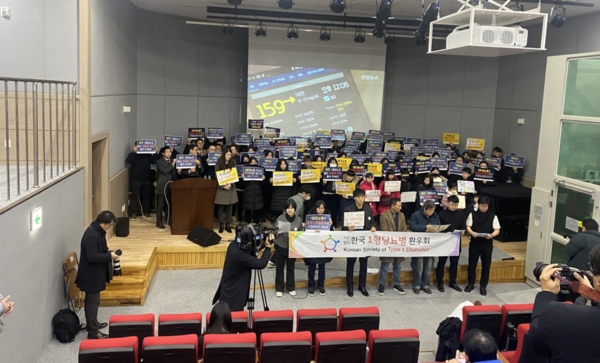
A family with an eight-year-old daughter with type-1 diabetes committed suicide in Taean, South Chungcheong Province, last week due to difficulties paying treatment costs, causing people in similar circumstances to hold a rally on Monday.
They called for government support, including the designation of type-1 diabetes as a severe and difficult disease and easing the burden of purchasing treatment devices, such as continuous glucose monitors.
"We are deeply grieved by the tragedy of the ‘Taean Type 1 Diabetes Family,’ the Korean Society of Type 1 Diabetes said at an emergency news conference at the Integrated Community Center in Sejong City. “We pray for the souls of the deceased. We cannot regard it as someone else's affairs."
The society emphasized it is especially significant that this incident occurred after the Ministry of Health and Welfare announced that it would ease the burden on children and adolescents with type 1 diabetes, pointing out that piecemeal reductions in the cost of devices will not solve the challenges faced by people with type 1 diabetes.
According to the society, part of the cost of continuous glucose monitors has been covered by health insurance since January 2019. However, only about 10 percent of people with type 1 diabetes in Korea use continuous glucose monitors, and only 5 percent use insulin auto-injectors.
To improve the situation, the participants called for the government to designate type 1 diabetes as a severe and difficult disease, reduce the patients’ burdens for medical expenses regardless of age, convert prescription and billing for management devices to nursing benefits, and provide rental support for expensive treatment devices.
"Generally, when an organ fails to function, such as kidney failure, it is classified as a severe and difficult disease. Type 1 diabetes is a 'pancreatic failure' in which the pancreas loses its function," the society said. “Please designate type 1 diabetes as a severe and difficult disease so that we can receive systematic education from specialized education teams at tertiary general hospitals."
It noted that the financial burden and management difficulties are the same for all age groups.
"The financial burden and management difficulties are the same for all ages," the society said. "Many patients struggle with complex medical billing procedures. Continuous glucose monitors and insulin auto-injectors are also essential medical devices that require proper intervention by medical staff and should be covered by the medical benefits."
They also requested rental support for these expensive devices, as they must purchase them with their own money if the devices broke down between the five-year support intervals.
They also called for a name change to improve social awareness of type 1 diabetes, also known as "juvenile diabetes.”
"Pediatric diabetes is a mysterious name that doesn't exist and causes a lot of misunderstanding and prejudice. It is even used in official documents of the Ministry of Health and Welfare and the Ministry of Education," the society pointed out. “Please change the name to pancreatic insufficiency or failure, which can indicate the severity and identity of type 1 diabetes."
They also requested support from the Ministry of Education for pediatric and adolescent students with school difficulties. Specifically, they requested medical support, including insulin injections through school nurses, permission to use electronic devices to manage blood sugar in school, and prioritization of nearness when assigned to advanced schools.
Besides, the society asked that type 1 diabetes be recognized as a pancreatic disorder because it requires lifelong management and limits their daily life and career choices.
"A person with a disability is a physical or mental impairment substantially limiting a major life activity. Type 1 diabetes fits the legal definition of a person with a disability," they said, urging that type 1 diabetes be recognized as a “pancreatic disorder.”
"Type 1 diabetes can be improved with the latest medical technology and institutional support. We urge the Ministry of Health and Welfare to apply its health care reforms to type 1 diabetes to achieve essential health care coverage and sustainability, and to hear the pleas of patients who don't want this tragedy to happen again," the society stressed.

